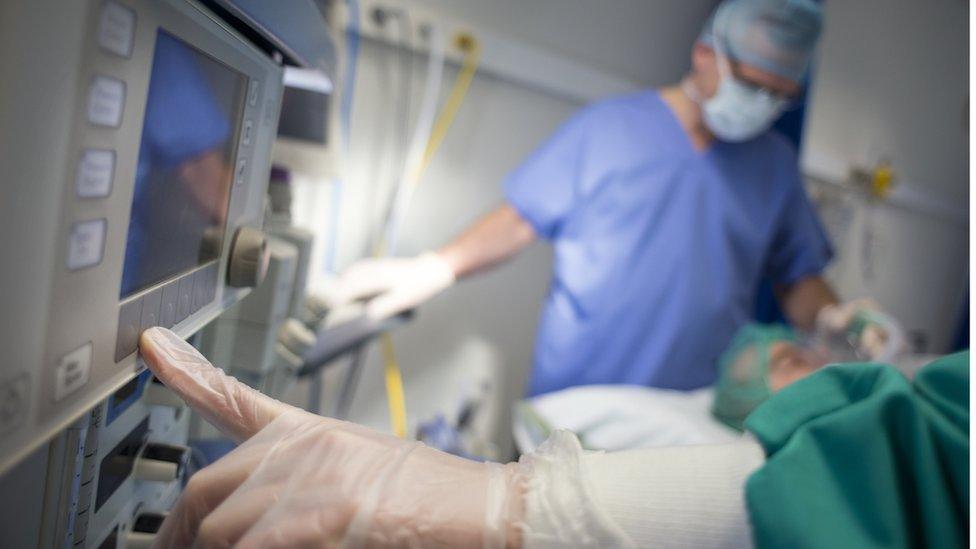Covid response hits rural NHS services hard - report
- Published
- comments

The report says hospitals in remote and rural areas face a steep climb to recover waiting lists
NHS patients in rural areas of England face extra long waits for treatment, according to a study.
The Nuffield Trust think-tank says urban areas benefited most from measures put in place to help the NHS cope with the coronavirus pandemic.
Researchers found rural hospitals now faced an uphill challenge when it came to restoring services to normal.
NHS England says that funding reflects the higher costs of delivering care in rural communities.
The Nuffield Trust report, external says while the number of Covid cases in rural areas was lower than in big urban centres, the pandemic's impact on services has been much greater.
It says the coronavirus crisis highlighted pre-existing problems facing rural trusts.
For example, it can be hard to recruit and retain doctors and nurses who are willing to work in smaller hospitals, which means trusts rely more heavily on expensive agency staff to fill gaps in rotas.
This, in turn, has a detrimental effect on the finances of hospital trusts which struggle to balance the books.
In addition, rural trusts often have only a limited capacity to treat any extra patients as they are often already very busy.

Experts are concerned that Covid has made a number of rural inequalities worse
Researchers looked at the impact of additional measures put in place in the early days of the pandemic to try and ease the pressure on the health service.
These included the creation of seven Nightingale hospitals in England, a £10bn deal to block book independent sector hospital beds, and extra funding to remodel services to provide hospitals with extra capacity.
The researchers found all these measures were likely to benefit NHS trusts in urban areas more than those serving rural or remote parts of England.
Dr Billy Palmer, senior research fellow at the Nuffield Trust, says there is no doubt the pandemic was a game-changer across the whole health and social care system.
"In the early stages of the pandemic, we saw the NHS put in national measures to help the service to brace itself for a surge in Covid-19 patients.
"Yet our research has found that many of these national policies inadequately considered the needs of rural areas and reflect the long-standing workforce, financial and capacity issues of rural and remote services.
"Rural services are far less likely to benefit from ambitions to use either the urban-centric Nightingale hospitals or the independent sector to clear waiting lists.
"Because of this starting position, rural areas face an ever-growing steep climb to recover from the pandemic without the growing resources, support or capacity available in more urban areas."
Cancer treatment affected
One area that researchers focused on was the provision of cancer treatment.
Across the NHS, the number of patients seen by a consultant for a first appointment fell significantly during the early months of the pandemic.
But in rural areas, the fall was 66% compared with 58% in urban areas.
The report says that means that in April of this year, 10,000 fewer patients in rural areas saw a cancer specialist.
The fall in the number of patients admitted for emergency care was also greater in rural areas, at 57% compared with 45% elsewhere.
Prof Richard Parish, chair of the National Centre for Rural Health and Care, said: "We continue to be concerned that Covid has made a number of rural inequalities worse.
"There doesn't appear to be much short-term prospect of respite. When there is, we still have to make progress towards a level playing field.
"This would involve, for a start, reducing the reliance on agency staff in rural health settings, speeding up rates of hospital discharge and reducing waiting times for elective surgery."
A spokesman for NHS England said the pandemic had presented challenges to the entire health service.
"Funding for health services in more rural parts of the country is already adjusted to reflect the higher costs of delivering care in those communities, including operating hospitals in remote locations and sending ambulances to patients who live there.
"The Covid-19 pandemic inevitably has disrupted routine health services but despite this the NHS has maintained essential services like cancer treatment, while also treating nearly 200,000 patients with Covid-19."